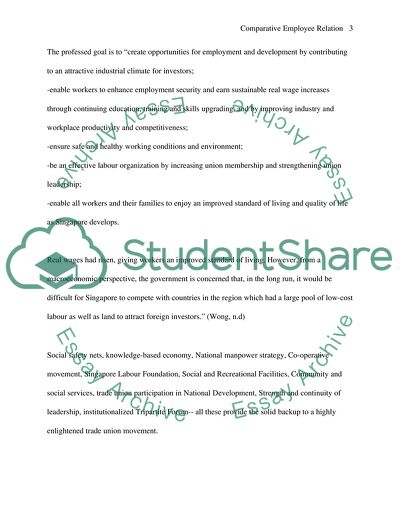
- Home
- Free Samples
- Premium Essays
- Editing Services
- Extra Tools
- Essay Writing Help
- About Us
- Studentshare
- Subjects
- Miscellaneous
- Comparative emplyee relation systems - singapore and eire
Comparative emplyee relation systems - singapore and eire - Essay Example

- Subject: Miscellaneous
- Type: Essay
- Level: Undergraduate
- Pages: 4 (1000 words)
- Downloads: 0
- Author: billybatz
Extract of sample "Comparative emplyee relation systems - singapore and eire"
To secure fair wages and working conditions and improvement in standard of living and standard of life (quality of life).But after attaining independence, since 1960, the role changed from that of conflict to co-operation. Workers considered themselves to be active partners in national development. In Singapore, the basic approach of the government, management and the employee unions has more or less remained the same even now. Concern for the welfare of the Nation is supreme; it is well above the motivated self-interests.
-enable workers to enhance employment security and earn sustainable real wage increases through continuing education, training and skills upgrading, and by improving industry and workplace productivity and competitiveness; Real wages had risen, giving workers an improved standard of living. However, from a macroeconomic perspective, the government is concerned that, in the long run, it would be difficult for Singapore to compete with countries in the region which had a large pool of low-cost labour as well as land to attract foreign investors.
” (Wong, n.d) Social safety nets, knowledge-based economy, National manpower strategy, Co-operative movement, Singapore Labour Foundation, Social and Recreational Facilities, Community and social services, trade union participation in National Development, Strength and continuity of leadership, institutionalized Tripartite Forum-- all these provide the solid backup to a highly enlightened trade union movement. The highly enlightened employee employer relationship has made a deep impact on the standard of life of the people.
A good social atmosphere prevails in Singapore. The workplaces are free from day to day tension, bitterness, and trade union related rivalries. However, the fast pace of globalization and the super fast advancement of technological innovations, has begun to give jitters to the best of the industrial relations, that
...Download file to see next pages Read MoreCHECK THESE SAMPLES OF Comparative emplyee relation systems - singapore and eire
Oversea-Chinese Banking Corporation in Singapore
Comparative Analysis of Employee Relations Systems in Singapore and Eire
Privileged Position of Knowledge Workers
Employee Relations System in Singapore and Eire
The Results of the Irish Economy
Managers and Individual Employment Rights
Job Security in Relation to Japan and India
E-Logistics and International Supply Chain Management in Singapore

- TERMS & CONDITIONS
- PRIVACY POLICY
- COOKIES POLICY